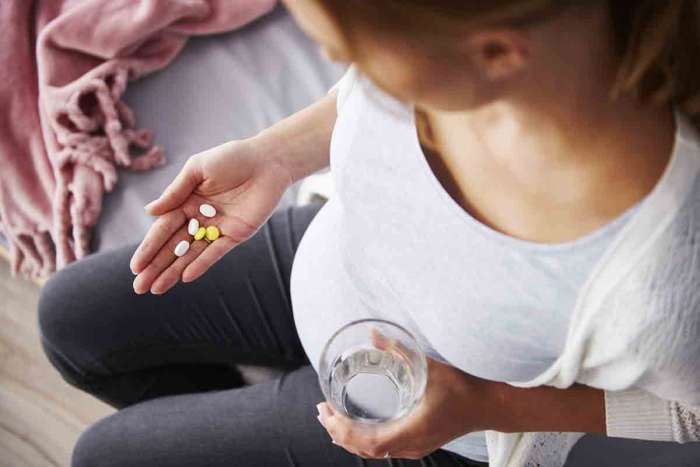Probiotics have become increasingly popular over the past ten years, as more research is done on the microbiome and the importance of gut health. There are many potential health benefits associated with these live microorganisms.
However, everything that you put into your body – even health supplements – becomes a question once you are pregnant.
You might be wondering whether it’s safe to consume probiotics when you have a baby on the way. This guide breaks down what probiotics are, the benefits of taking them during pregnancy, and any safety precautions to be aware of.
Related: Prenatal Vitamins: The Benefits and the Ingredients to Avoid
What Are Probiotics?
Probiotics are the living microorganisms that live in the human gut. Most of these organisms are bacteria, and some are yeast. They help with digestion and ensure that you absorb the nutrients from the food you eat. They also support your immune system. There are different strains of probiotics each with unique health benefits.
Your digestive system naturally contains probiotics, but they can get out of balance. You can take probiotics to re-balance the good bacteria in your system. Probiotics are found naturally in some foods such as:
Can You Dye Your Hair While Pregnant?
If you're wondering whether you should bleach, dye, or highlight your hair during pregnancy, we've gathered specific recommendations from the American Pregnancy Association to help answer your question. Read More
- Yogurt
- Kefir
- Sauerkraut
- Kimchi
- Kombucha
Probiotics can also be taken in the form of dietary supplements such as pills and gummies. Probiotic supplements are easily found in most grocery stores and pharmacies.
Are Probiotics Safe to Take During Pregnancy?
Probiotics are generally considered safe to take when you are pregnant. That being said, you should avoid eating raw foods during pregnancy, so it does matter how you take your probiotics. Always check with a healthcare professional before adding anything new to your pregnancy diet.
When it comes to taking probiotics during pregnancy you should avoid consuming probiotics in the form of any raw food or unpasteurized dairy products as these probiotic foods are not safe for pregnant people.
However, there are safer ways to consume these good bacteria, such as taking probiotic supplements or eating yogurt that contains live cultures.
When to Take Probiotics?
Probiotics may be especially helpful to those who suffer from digestive issues, such as constipation, bloating, or irritable bowel syndrome, because of the way they benefit the digestive system. There is some evidence that those with weakened immune systems or skin conditions like eczema may find benefit in taking probiotics.

Any time your doctor puts you on antibiotics, it’s always a good idea to take some probiotics. Antibiotics work to kill bacteria when you have an infection, but they don’t discriminate between the good bacteria that your body needs and the infection.
Everything gets wiped out, and when you don’t have the good gut bacteria that you need, you can face digestive issues like diarrhea.
Generally, probiotics are good for you and contribute to a healthy gut. They can make you healthier and improve your digestion. There are not many people who specifically should not take probiotics.
Benefits of Probiotics While Pregnant
Taking probiotics may offer some benefits to pregnant women. Most of the research is still inconclusive for now, but we have good reason to believe that probiotics can improve your health during pregnancy.
During pregnancy, it is important to maintain a healthy gut microbiome to ensure the health of both the mother and the developing baby. Probiotics have been shown to reduce the risk of gestational diabetes, pre-eclampsia, and vaginal infections during pregnancy. They may also help alleviate constipation, which is common during pregnancy.
Lowers the Risk of Gestational Diabetes
A small amount of research indicates that probiotics may reduce your risk of getting gestational diabetes. This type of diabetes comes about during pregnancy, and it is associated with several pregnancy complications, including preterm birth, high birth weight babies that grow too large to be delivered safely, preeclampsia, and the development of Type 2 diabetes later in life.
Popular types of probiotics like Lactobacillus and Bifidobacterium have been found to improve insulin sensitivity, which helps to prevent gestational diabetes. These types of probiotics also reduce inflammation and excess weight gain, so these factors could play a role as well.
May Lower the Risk of Pre-Eclampsia
Preeclampsia is a pregnancy complication characterized by high blood pressure and damage to organs, typically the liver and kidneys. It affects 5-8% of pregnancies worldwide and is a leading cause of maternal and fetal morbidity and mortality.
Probiotics have been shown to reduce inflammation, modulate the immune system, and improve gut microbiota, all of which are factors that may reduce the risk of preeclampsia. A 2011 study published in the American Journal of Epidemiology examined the association between the consumption of milk-based probiotic foods (such as fermented yogurts) in pregnancy and the development of preeclampsia.
The results showed that regular consumption of probiotic products was associated with decreased risk of preeclampsia during pregnancy.
Prevents Vaginal Infections
During pregnancy, you are more vulnerable to vaginal infections such as bacterial vaginosis and yeast infections. Shifting hormone levels can alter the vaginal pH so that these microorganisms that you don’t want thrive.
Taking probiotics during pregnancy can help improve vaginal health and balance things out in your body. In this way, beneficial bacteria will naturally protect you against yeast or harmful bacteria. The probiotic Lactobacillus has been found to be effective in preventing and treating bacterial vaginosis.
Reduces the Risk of Preterm Birth
There is some evidence to suggest that the use of probiotics may be beneficial for pregnant women. For example, they may help prevent vaginal infections and reduce the risk of preterm birth. However, more research is needed to fully understand the effects of probiotics on pregnancy.
Benefits of Probiotics While Breastfeeding
Continuing to take probiotics after you give birth may benefit both you and your baby. Following are a few reasons to take probiotics while you are nursing and during your postpartum period.
Reduces the Risk of Postpartum Depression
We don’t yet know exactly how it works, but some research on probiotics and postpartum depression indicates that probiotics may help lower your risk of developing postpartum depression (PPD).
It’s possible that probiotics reduce inflammation in your system or that they help to balance your hormones. Even the effects on your immune system and digestion may play a role in preventing PPD.
Supports Infant Development
When you breastfeed, you pass probiotics through breast milk to your baby. This is true whether you take probiotic supplements or not. Breast milk naturally contains probiotics. The probiotics you consume do not transfer directly to your baby but they will make you healthier, and that can provide additional benefits to your nursing.
In general, any type of probiotic is fine to take when you’re breastfeeding. If you are unsure, check with your OB/GYN or a lactation consultant.

Safety Precautions for Taking Probiotics During Pregnancy
If you choose to take probiotics during your pregnancy, there are a few safety precautions to bear in mind. Consider the following when choosing and taking these microorganisms with a baby on the way:
Consult Your Healthcare Provider
Always get the OK from a healthcare professional before adding anything to your diet during pregnancy. This is especially important if you take other medications—it’s possible that the interaction of probiotics and your medications may be harmful.
Follow the Safe Probiotic Dosage Instructions
It is important to follow the recommended dose on the bottle or to check with your provider about this. Also pay careful attention to storage instructions, for example, some types of probiotics may need to be stored in a cool environment.
Look for Bacteria That Has Been Studied in Pregnant Women
Your best bet is a product that contains strains that have been studied in pregnant women. This not only gives more peace of mind that it’s safe to take, but it also ensures that you’ll maximize any potential benefits. Some examples of pregnancy probiotics that have been researched and are considered safe during pregnancy are Lactobacillus rhamnosus and Bifidobacterium lactis.
If You Have Negative Side Effects Stop Taking Probiotics Right Away
If you experience any negative side effects while taking probiotics, such as signs of an infection or problems with digestion, stop taking them. It would also be advisable to contact your healthcare provider if this happens.
How to Incorporate Probiotics Into Your Pregnancy Diet
You can add fermented foods such as kimchi or yogurt that contain live cultures into your diet. Supplements are another option. Even just adding more fiber into your diet will increase the number of good bacteria that develops naturally in your gut.
Some people choose to take prebiotics with their probiotics. These work similarly to consuming fiber, helping your body absorb the probiotics.
Natural Probiotic Options
If you want to eat probiotics in your foods, try adding the following to your diet:
- Kimchi
- Miso
- Pickles (maybe that’s the reason that these are the quintessential pregnancy craving!)
- Sauerkraut
- Sourdough bread
- Tempeh
- Yogurt (must contain live cultures)

Can I Take Probiotics With Prenatal Vitamins?
Taking probiotics with prenatal vitamins and other pregnancy supplements is generally not considered harmful as long as you get approval from your healthcare provider. Probiotics may even help to relieve constipation that prenatal supplements can cause due to their iron content.
Probiotics are a different substance than most popular prenatal vitamins and prenatal supplements. Taking a probiotic strain will work differently in your body than a multivitamin containing different amounts of vitamins and minerals.
You should always take prenatal vitamins before conceiving, throughout pregnancy, and during your postpartum recovery period.
Probiotics are generally safe to take during pregnancy, and they may have benefits for your and your baby’s health. Just make sure to get your OB-GYN or healthcare provider’s OK before trying them out.



